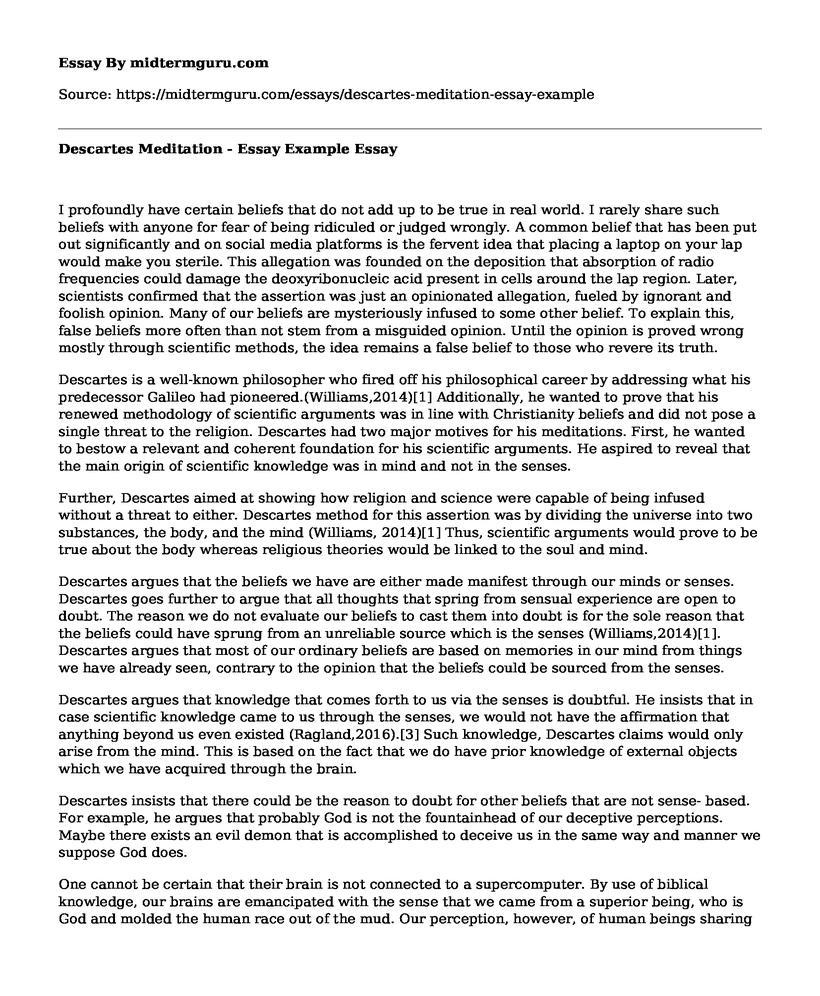I profoundly have certain beliefs that do not add up to be true in real world. I rarely share such beliefs with anyone for fear of being ridiculed or judged wrongly. A common belief that has been put out significantly and on social media platforms is the fervent idea that placing a laptop on your lap would make you sterile. This allegation was founded on the deposition that absorption of radio frequencies could damage the deoxyribonucleic acid present in cells around the lap region. Later, scientists confirmed that the assertion was just an opinionated allegation, fueled by ignorant and foolish opinion. Many of our beliefs are mysteriously infused to some other belief. To explain this, false beliefs more often than not stem from a misguided opinion. Until the opinion is proved wrong mostly through scientific methods, the idea remains a false belief to those who revere its truth.
Descartes is a well-known philosopher who fired off his philosophical career by addressing what his predecessor Galileo had pioneered.(Williams,2014)[1] Additionally, he wanted to prove that his renewed methodology of scientific arguments was in line with Christianity beliefs and did not pose a single threat to the religion. Descartes had two major motives for his meditations. First, he wanted to bestow a relevant and coherent foundation for his scientific arguments. He aspired to reveal that the main origin of scientific knowledge was in mind and not in the senses.
Further, Descartes aimed at showing how religion and science were capable of being infused without a threat to either. Descartes method for this assertion was by dividing the universe into two substances, the body, and the mind (Williams, 2014)[1] Thus, scientific arguments would prove to be true about the body whereas religious theories would be linked to the soul and mind.
Descartes argues that the beliefs we have are either made manifest through our minds or senses. Descartes goes further to argue that all thoughts that spring from sensual experience are open to doubt. The reason we do not evaluate our beliefs to cast them into doubt is for the sole reason that the beliefs could have sprung from an unreliable source which is the senses (Williams,2014)[1]. Descartes argues that most of our ordinary beliefs are based on memories in our mind from things we have already seen, contrary to the opinion that the beliefs could be sourced from the senses.
Descartes argues that knowledge that comes forth to us via the senses is doubtful. He insists that in case scientific knowledge came to us through the senses, we would not have the affirmation that anything beyond us even existed (Ragland,2016).[3] Such knowledge, Descartes claims would only arise from the mind. This is based on the fact that we do have prior knowledge of external objects which we have acquired through the brain.
Descartes insists that there could be the reason to doubt for other beliefs that are not sense- based. For example, he argues that probably God is not the fountainhead of our deceptive perceptions. Maybe there exists an evil demon that is accomplished to deceive us in the same way and manner we suppose God does.
One cannot be certain that their brain is not connected to a supercomputer. By use of biblical knowledge, our brains are emancipated with the sense that we came from a superior being, who is God and molded the human race out of the mud. Our perception, however, of human beings sharing the same thoughts and feelings based on our senses could be an indicator that our brains are wired together in a sophisticated manner.
Bibliography:
1. Descartes, Rene. "Meditations on first philosophy." Central Works of Philosophy Central Works of Philosophy is a multi-volume set of essays on the core texts of the Western philosophical tradition. From Plato s Republic to the present day, the volumes range over 2,500 years of philosophical writing covering the best, most representative, and most influential work of some of our greatest philoso (2015): 15.
2. Ragland, C. P. "Self, Reason, and Freedom: A New Light on Descartes Metaphysics." The Review of Metaphysics 69, no. 3 (2016): 618-620.
3.Williams, Bernard. Descartes: The project of pure inquiry. Routledge, 2014.
Cite this page
Descartes Meditation - Essay Example. (2021, Jun 07). Retrieved from https://midtermguru.com/essays/descartes-meditation-essay-example
If you are the original author of this essay and no longer wish to have it published on the midtermguru.com website, please click below to request its removal:
- Ethics in Social Science - Paper Example
- Philosophy Essay Example: Ethical Dilemma
- The Marxist Alienation - Essay Sample
- Essay Sample on Productive Businesses Priorities
- Annotated Bibliography on Plato and Aristotle Philosophy
- Ethics in Communication: Ensuring Authentic Communication for Businesses - Essay Sample
- Psychologists' Ethical Duties: Safeguarding Rights for Effectiveness - Essay Sample







